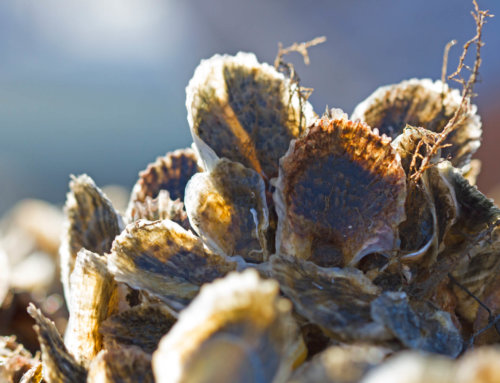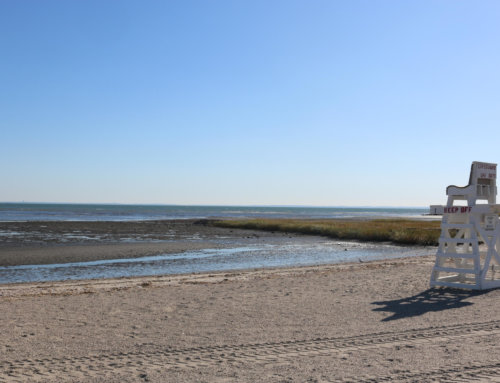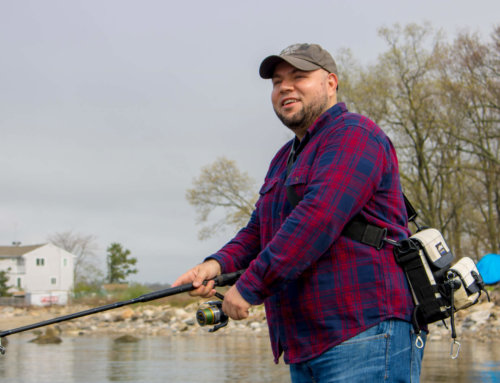Young Environmentalist Is Inspired By Growing Up On Long Island Sound
January 23, 2019 | By: Christianne Marguerite
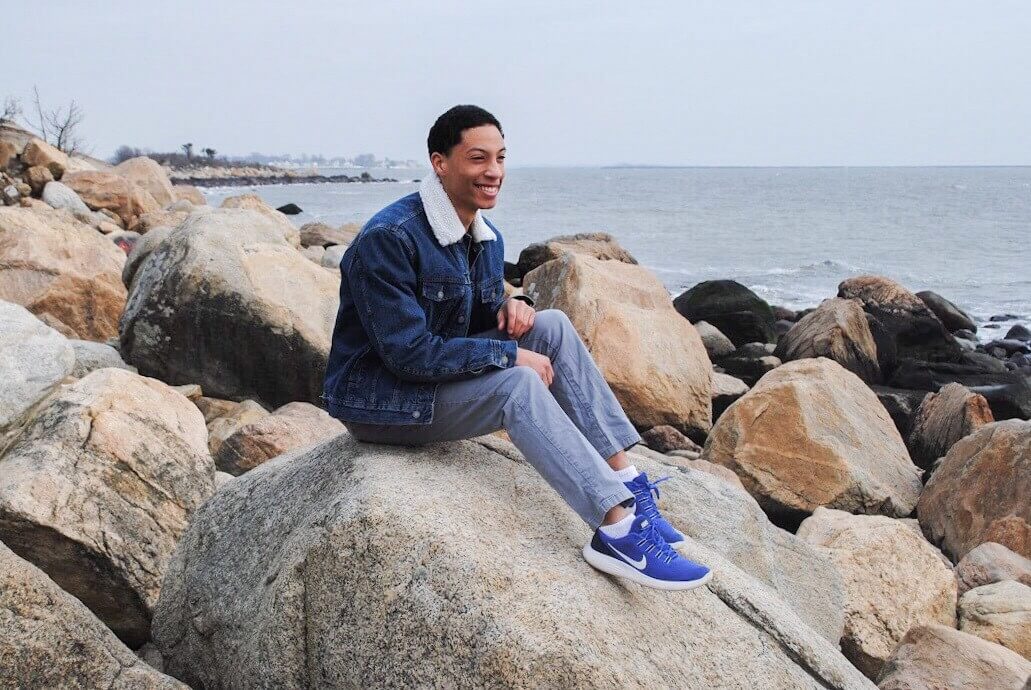
Zanagee Artis at Hammonasset Beach State Park © The Nature Conservancy (Christianne Marguerite)
While home on winter break from Brown University, 18-year old Zanagee Artis, Co-Founder of Zero Hour, talks about his love for Long Island Sound. He discusses how growing up on the Connecticut coastline has influenced his interest in environmental work. With the issue of nitrogen pollution harming our coastal waters, The Nature Conservancy’s Long Island Sound Program is excited to see a younger generation taking action to improve water quality.
Zanagee Artis remembers catching crabs along the shoreline with his brothers while in elementary school. They would wait quietly around the tiny holes that surrounded the rocky pier, eagerly anticipating the small crabs peeking out to see the sun. They would giggle as they tried to hurriedly close their hands around the crab before it scurried back inside the hole, making a game out of who could collect the most of these creatures. He says, “We got the crabs in buckets, but we didn’t keep them- we put them back.”
Although he didn’t know it back then, he now realizes that it was childhood experiences like these that inspired his current environmental work. Growing up just a short walk away from Hammonasset Beach State Park in Clinton, Conn., Zanagee spent most of his childhood at the beach. His family often went hiking along the park trails simply to spend time in nature, and sometimes went fishing and kayaking in Long Island Sound. Zanagee’s exploration and understanding of the coastal ecosystem and wildlife as a kid quickly turned into a passion for marine life conservation and climate justice.
“Living by the shore is something that made me more connected to the environment and gives me something that I’m fighting for.”
-Zanagee Artis, Co-Founder of Zero Hour
During high school, Zanagee was part of the National Honors Society and started a Sustainability Committee, which later grew into his school’s Green Team. In the summer between his junior and senior years, he and his friends started a youth-led movement known as Zero Hour. Zanagee is one of many young environmental leaders who are part of this call for climate action. Their mission is to center the voices of diverse youth in the conversation around climate and environmental justice. Zero Hour has partnered with many global environmental organizations and made international headlines with their Youth Climate Lobby Day, Art Festival, and Youth Climate March in July 2018. They are currently gearing up for their next large-scale climate action in Florida this July 2019.

Zero Hour March On Capitol Hill. © thisiszerohour.org
Zanagee is now a first-year student at Brown University, planning to double-major in Political Science and Environmental Studies. Last semester, he had the opportunity to do research on plastics in Rhode Island for his undergraduate course titled “Humans, Nature, and The Environment: Addressing Environmental Change in the 21st Century.” Each student partners with a local community organization to complete a project for the class. Based on his interests, Zanagee was paired with a task force created by Governor Gina M. Raimondo (D-RI) to address reducing plastics in the area. His goal was to research different local, national, and international legislation about “plastic bags, plastic bottles, and plastic straws” to figure out what has been most effective and present his findings and recommendations to the task force for a future policy. The issue of single-use plastics is near and dear to his heart because he believes that not only is there “a ton of contamination in recycling,” but also that plastics are a major pollutant in our oceans and are causing great harm to our marine life and coastal ecosystems.
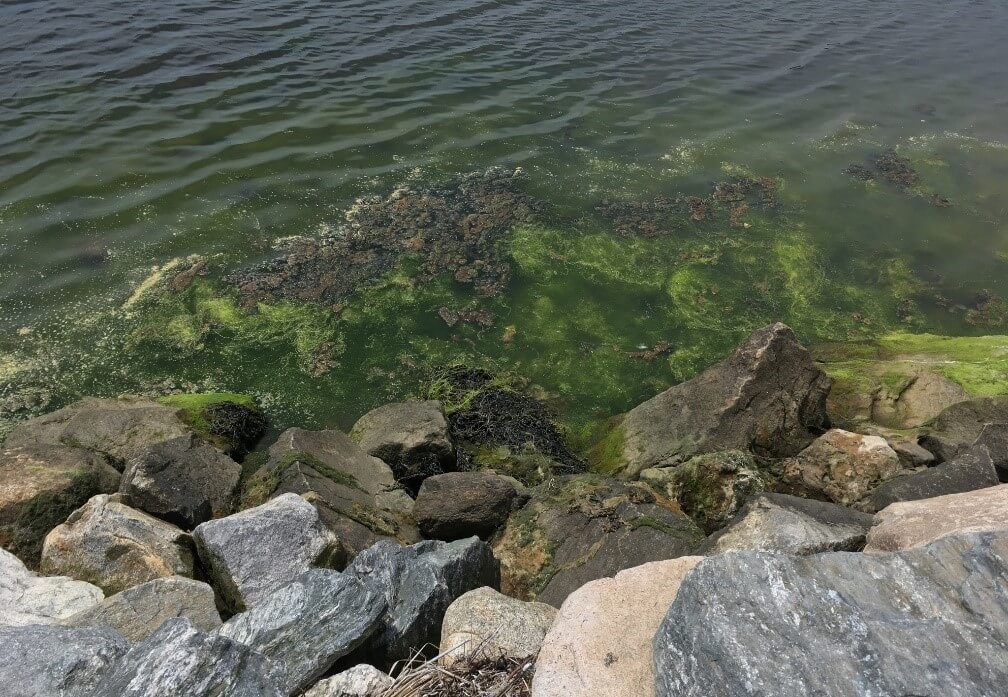
Cladophora Algae in Stonington, Conn. © The Nature Conservancy (Rachel Lowenthal)
His words are echoed by The Nature Conservancy’s own mission- to conserve the lands and waters on which all life depends. The Conservancy’s Long Island Sound Program focuses on restoring healthy conditions in coastal rivers, harbors and bays by speeding up efforts to reduce nitrogen pollution in this renowned estuary. Like plastics, nitrogen poses serious risks to marine ecosystems and to human health. Nitrogen pollution from sewage treatment plants, septic systems, and fertilizers eventually makes its way into the Sound and triggers the rampant growth of algae that can deplete oxygen in the water, kill fish and poison the shellfish that we eat.
Harmful algal blooms are occurring more frequently as water temperatures warm. This means we must reduce more nitrogen pollution from sewage and fertilizers to maintain healthy conditions for swimming, boating and catching crabs in the Sounds coastal harbors and bays.
Together with partner organizations and local stakeholders, The Nature Conservancy is actively working to reduce nitrogen pollution in the Sound through projects that raise community awareness and build support for policies like setting pollution limits, restricting fertilizer use and investing in modern septic systems. The Nature Conservancy seeks local perspectives, including the voices of youth to help ensure that we take quick, sustainable action for cleaner water and safer beaches that young people can enjoy now and for generations to come.
“Environmentalists like Zanagee set a wonderful example of how young people can help safeguard the natural systems we rely on” director of outreach and watershed projects, Holly Drinkuth, said. “Long Island Sound inspires and sustains so many people who live here – and we can all do our part to keep it clean and healthy”.
Some of the Sound’s coastal harbors and bays have reached a tipping point – but there are solutions we can use to protect our unique way of life. Everyone can do their part to support conservation by encouraging local officials to support policies that protect our environment. Young leaders like Zanagee are stepping up and calling for greater global environmental action because they realize that we have run out of time. Together with his peers, Zanagee is empowered to dedicate his life to environmental work and inspire others to do the same. His generation has mobilized into a powerful intersectional movement for climate justice so future generations can see a better, cleaner world and we should all be following suit.
